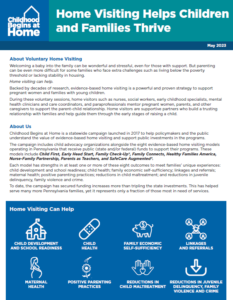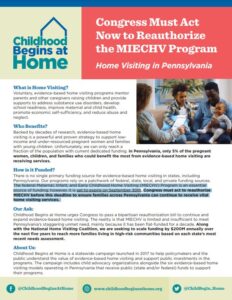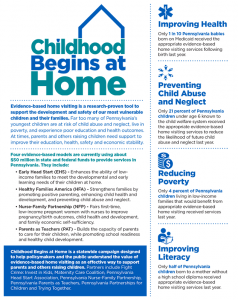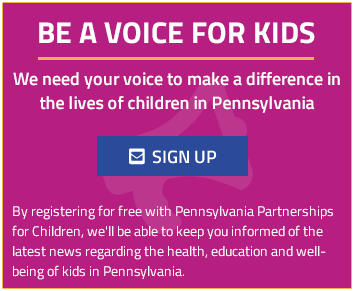The Childhood Begins at Home campaign released new fact sheets that show the number of young children and their families receiving publicly funded, evidence-based home visiting services statewide and in each county. While a historic level of increased funding in last year’s state budget helped serve more Pennsylvania low-income families—moving from 5% to 7% served—it still represents only a fraction of those most in need of services.
By Subject: Child Welfare | Early Childhood Education | Home Visiting | K-12 Education | Maternal and Child Health | Prenatal-to-Age-Three
Fact Sheet: Congress Must Act Now to Reauthorize the MIECHV Program – July 2022
The Maternal, Infant, and Early Childhood Home Visiting (MIECHV) program strengthens communities by improving outcomes for children and their families. A cornerstone of evidence-based public policy, MIECHV provides funds for developing and implementing voluntary, evidence-based home visiting programs. Programs must meet at least four of six evidence-based benchmarks to satisfy the law’s rigorous requirements for demonstrated effectiveness. MIECHV is an essential source of funding; however, it is set to expire on September 30th. Congress must act to reauthorize MIECHV before this deadline to ensure families across Pennsylvania can continue to receive vital home visiting services.
Home Visiting Resources
- Statewide Fact Sheet (2022)
- Fact Sheet Data Table
- Report: Forward Thinking: Diversifying Funding to Grow and Sustain Evidence-Based Home Visiting in Pennsylvania (2021)
Evidence-based home visiting programs recognize parents are children’s first teachers, but sometimes even parents and others raising children look for help. Far too many of Pennsylvania’s youngest children live in poverty and experience poor education and health outcomes. Voluntary home visiting programs help parents and others raising children with the supports necessary to improve health, safety, literacy and family self-sufficiency. During home visits, nurses or other trained professionals visit with women, families and children – some as early as pregnancy to promote positive birth outcomes – to provide parent education and support, ultimately promoting child health, well-being, learning and development.
Report and State & County Fact Sheets: Childhood Begins at Home (Home Visiting) – April 2018
A nurturing childhood leads to a strong, productive adult who will contribute great things to our society. But let’s face it, raising children is challenging and difficult even in the best situations. Home visiting programs recognize parents are children’s first teachers, but sometimes even parents need help. Childhood Begins at Home is a statewide campaign to help policymakers and the public understand the value of and support public investments in evidence-based home visiting.







PAP4Children Follow 9,904 2,626
Pennsylvania Partnerships for Children is dedicated to improving the well-being of PA's 2.6 million kids. We're independent, non-partisan and non-profit.
It's Thursday, and you know what that means. It's time for your next PPC #summerreadinglist assignment! If you want to learn more about Medicaid & CHIP, this is the fact sheet for you. If you're interested in data, this is ALSO something for you. https://ow.ly/sfnI50SFcR5
Happy National #BeAGoodTeammateDay! Want to meet some of our favorite teammates? Meet the PPC team! https://ow.ly/wo4Q50SG4v1
Happy #NationalIceCreamDay! Stay cool with some ice cream and by signing up for our email list. Nothing is cooler than data...right? https://ow.ly/jfv950SEwnL
Check out this new report from the Annie E. Casey Foundation - New Insights on State Kinship Diversion Policies
New Insights on State Kinship Diversion Policies
Kinship diversion can help keep kids out of foster care. Review state policies and understand why engaging family in these arrangements matters.
www.aecf.org